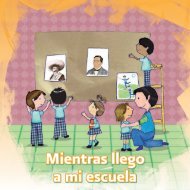Spanish for K-8 Heritage Speakers: A Standards-Based Curriculum ...
Spanish for K-8 Heritage Speakers: A Standards-Based Curriculum ...
Spanish for K-8 Heritage Speakers: A Standards-Based Curriculum ...
You also want an ePaper? Increase the reach of your titles
YUMPU automatically turns print PDFs into web optimized ePapers that Google loves.
32 Hispania<br />
91 March 2008<br />
translated from their original <strong>Spanish</strong> to reach a wider audience.<br />
Grade<br />
level<br />
Theme Four "big ideas" (one per quarter)<br />
Our worlds What is the world I live in like?<br />
My place in<br />
the world<br />
Building<br />
What does one need to live in our world?<br />
How do we coexist with nature?<br />
What are children like in other parts of the world?<br />
What is my community like?<br />
My land through the lens of art<br />
<strong>Spanish</strong>-speaking lands through the lens of science<br />
<strong>Spanish</strong>-speaking lands throughout time<br />
Connections between my land and myself<br />
bridges<br />
Bridges between the past and my present<br />
How are the different <strong>Spanish</strong>-speaking communities connected?<br />
Links between the <strong>Spanish</strong>-speaking communities and the global community<br />
What is<br />
What is culture?<br />
culture?<br />
Analyzing<br />
a cultural artifact: corn<br />
Analyzing<br />
a cultural artifact: music<br />
Analyzing a cultural artifact: visual and per<strong>for</strong>ming arts<br />
My culture Exploring my culture<br />
How is culture reflected where I live?<br />
Cultural<br />
changes over<br />
time<br />
Two cultures meet: An exploration of immigration. Developing<br />
environmental culture<br />
Tainos<br />
Aztecs<br />
Incas<br />
Civil Rights movements<br />
Our heroes Breaking barriers: Our American<br />
Heroic acts<br />
heroes<br />
Crossing<br />
borders<br />
Family heroes: We are products of our cultures<br />
Dear heroes: Heroes of 9/11/01 and 3/11/04<br />
<strong>Spanish</strong>: A language without borders<br />
A foot on each side: The pleasure of being myself<br />
Invisible borders: Social classes<br />
Beyond borders: Growing in tolerance_<br />
Novel travels The border between family and friends<br />
The border between fiction and reality<br />
The border between freedom and silence<br />
The border between fact and opinion: A media study<br />
"Big<br />
Table 1<br />
Ideas" <strong>for</strong> Each Year<br />
In the K-second grade cluster, the big ideas <strong>for</strong> each grade take into account the unique<br />
developmental needs of this age group, which is just beginning to encounter print literature <strong>for</strong><br />
the first time. Children at this age also explore the world outside their homes and families <strong>for</strong> the<br />
first time. The scope of themes <strong>for</strong> this cluster starts with the specific at the kindergarten level<br />
(Who am I?). It then gradually moves out of the home and into a more global vision by second<br />
grade as children become aware of the world outside their immediate context, the family. Finally,<br />
in second grade, the scenarios encourage students to connect their knowledge from the previous<br />
two years and to extend themselves beyond the study of <strong>Spanish</strong> speaking countries into the rest<br />
of the world.<br />
In the third-fifth grade cluster, students continue to explore the bridges between them<br />
selves, their families, their community members, their heritage countries, other <strong>Spanish</strong>-speaking<br />
countries, and the rest of the world, but in these years, it proves developmentally appropriate to<br />
<strong>for</strong>mally introduce the term and concept of culture. In third grade, students become cultural<br />
detectives as they learn to identify the differences between natural and cultural phenomena.<br />
Students continue this thematic spiral by analyzing their own culture under the theme of "My<br />
culture" in fourth grade. Finally, in fifth grade, students conclude their explicit study of culture<br />
an



